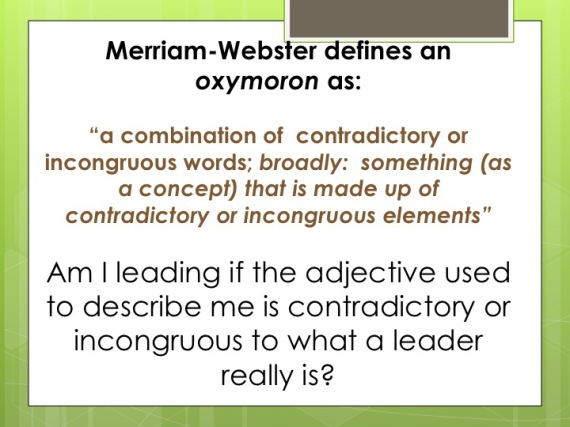The Indispensible Leader- Oxymoronic Leadership Yarn #7
“We won!!!!” The text message came through as Tim was laying out his guidance to the night shift supervisors. He sent a quick smiley face to his daughter and kept talking.
As he pulled into the garage, he knew his wife would not be happy that he was home again after 7:30 PM. He missed the soccer game, dinner and the baby’s bath time. She wouldn’t understand why he was late, and he still had more work to do tonight.
When Beth plopped down at the dinner table, Tim immediately knew the conversation was not going to be quick. They had done this before. What is presented below is a summary.
Point (Beth) – Counterpoint (Tim) #1
Point: You stay late every night to give the night shift supervisors their tasks. Why is that necessary?
Counterpoint: I am their boss. I need to give them their priorities.
Point: If they are supervisors, shouldn’t they know what their priorities are? Did you promote the right people?
Counterpoint: They are good men. But, I am responsible for everything that happens. I have to be involved what is going on.
Point: Do you have to be or do you want to be? Maybe you should find people you can trust to do their job well?
Counterpoint: I do trust them.
Point: Well, I know you trust me to take care of things at home, but you don’t give me detailed instructions everyday. Why do you need to do that for them?
Counterpoint: (Silence)
Point (Beth) – Counterpoint (Tim) #2
Point: Why do you feel the need to be “on call” at a moment’s notice for work? During meals, at soccer games, at church, in the middle of conversations with the kids- You will jump up to answer the phone or answer a text. Plus, you check email constantly.
Counterpoint: I have to be available to answer questions. They may need my input. What if it is an emergency?
Point: You manufacture components for computers. In 15 years, has their ever been a real life or limb threatening emergency?
Counterpoint: Don’t be so dramatic. When we have a mechanical failure on one of the lines, that can put us seriously behind schedule.
Point: That may be a problem. But is that truly an EMERGENCY! Besides, why can’t the people currently on duty fix the issue? Aren’t they capable of solving problems themselves?
Counterpoint: I need to know what is going on. I feel better if I am informed immediately. I have been doing this for a long time. I know how to fix these problems quickly and get things moving again. I would feel out of touch if I turned off my phone.
Point: So being “on call” is more about you and your needs than it is about the needs of your team or the company?
Counterpoint: (Silence)
Beth’s Request
“I love you Tim. I know you think you can’t miss anything at work. My concern is you have prioritized work over your family.
I know you play an important role at work. But, YOU ARE NOT INDISPENSIBLE at work. You are indispensible here with your family. Can’t you work to set things up at work so you can make us your priority instead of them?”
At that point, Tim’s phone rang. “Hold on to that thought honey.”
Tim listened to the caller and said gave a one word answer. “Green.”
When he hung up, Beth asked, “What did they need?”
“They wanted to know what color paper to use for the bulletin board announcements.”
Point: “Well, thank God you were there for them on that one.”
Counterpoint: (Silence)
The Bottom Line:
Leaders who believe they are indispensible often set themselves up to be just that. An Indispensible Leader is an OxMORONic Leader.
Tim set up a culture where he was the center of the organization.
- He had to know everything that was going on.
- He had to approve all decisions that were made.
- He had to be notified of every incident so he could weigh in.
- He had to be involved in decisions that were well below his pay grade.
Why? Beth nailed it. It was about his needs. He needed to be needed. Therefore he set up a system that made him indispensible.
Real leaders are not indispensible. A real leader sets up a culture of leadership. In a culture of leadership, the leader allows other people to make decisions and mistakes.
The leader is focused on developing leaders for the future, not avoiding mistakes in the present. As a result, trust builds between the leader and the led.
A culture of leadership is based on trust. The leader trusts his people to make wise decisions, and his people know they are trusted.
In Tim’s case, his issue was about his need to be needed. As a result, his team never developed beyond following his orders and trust suffered.
While Tim wanted to be indispensible at work, his family was begging him to act like he was indispensable at home. At work, he was being a OxyMORONic Leader.
The irony is, the only time Tim was actually and Indispensible Leader was at home.
Another view of this can be found in: To Lead A Low Maintenance Team You Must: Surrender Self.
Question:
What can you do to be less indispensible at work?

